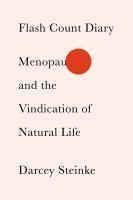
“Every ten years or so, I either go back to therapy or I write a book in order to tell myself again, in a new way, my life story. This current version is death heavy, feminism heavy, whale heavy, but also multilayered, even multigenerational. I’m not only fifty-six but also seven, twelve, twenty-seven, thirty-four, and forty-eight. My story is like a choral piece with many different parts. In fact there are so many separate but connected narratives that I sometimes feel a temporal vertigo—I am all ages and no age at all.”--Darcey Steinke, Flash Count Diary: Menopause and the Vindication of Natural Life, page 212.
Darcey Steinke’s Flash Count Diary: Menopause and the Vindication of Natural Life opens with the archetype of menopause: the hot flash. Yes, it’s personal. But it’s also universal. So is this book. Steinke writes about the science of hormone replacement and the lives of female whales, the nuances of her relationship with her mother, her marriages, and how patriarchy has positioned menopause as a condition that must be fixed—often for the benefit of men, not the women experiencing this transition.
I found this book a fascinating read not just about biology and nature; but about aging in this particular society. Steinke writes about menopause as part of a person’s life, not the only thing in life; meaning, while she experiences hot flashes and depression and the other symptoms common to a woman going through menopause, she is also still a grieving daughter, a wife, a mother, a writer, a friend. She takes us with her on whale watching expeditions and uses the narrative of whales experiencing menopause to posit that it’s not the physical change in a body that carries shame and stigma; rather, it’s how our society has prioritized the male gaze, how it values youth over the advantages that come with age.
As interesting as the science was in this book, as meticulously researched and reported as it was, it was the memoir of the book that really got me. Steinke is honest about sex and marriage and about being an aging woman in a world that values youth. What struck me most, however, was the story of her mother’s death. Steinke shares passages from her mother’s journal—passages that show how unhappy her mother was, how unappreciated she felt by both her ex-husband and her children, how she longed for a life of her own. Steinke recounts the last meal they shared, how that evening wasn’t perfect and I felt a longing there, not just a regret that she’d wished she’d been kinder to her mother but a yearning to know her mother as a woman, not just as the person who gave birth to and then raised her.
It’s an interesting thing to see the people we love through a different lens. Steinke strives to do this with her mother: “…It’s been five years since my mother died, and then, many days later, the police found her body naked on the living room floor. In the years since her death I’ve contemplated her monstrousness, her witch-like power. I’d dismissed her pain as outsize bitterness. But that is too easy, reductive.” As she works her way through her mother’s belongings, she learns more about what made her mother tick—as a woman of a certain age, as a divorcee, as an overweight person, as a person shamed since childhood for one reason or another. And through this understanding Steinke grapples with her own shame, her own questions, her own identity as a woman in a world that says she must be fixed.
I find myself thinking that Maggie Nelson, in her blurb, is on to something because I, too, want to buy copies of this book and give them to everyone I know.
